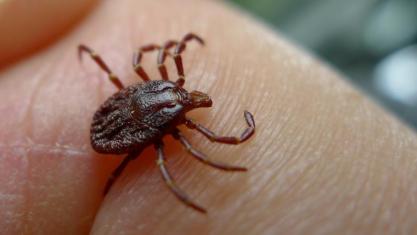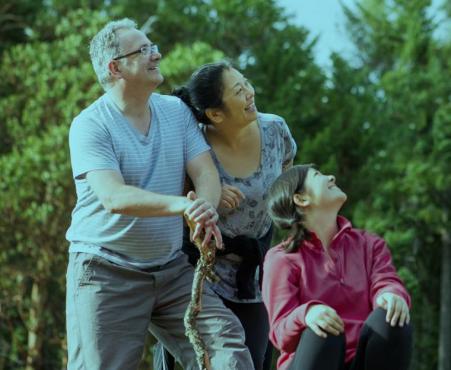- Managing your Practice
-
- Your Benefits
-

Introducing the ultimate Club MD experience
From work to play, and everything in between, we provide you with access to hundreds of deals from recognizable, best-in-class brands, elevating every facet of your life – from practice supports to entertainment, restaurants, electronics, travel, health and wellness, and more. Your Club MD membership ensures that these deals are exclusive to you, eliminating the need to search or negotiate.
Welcome to the ultimate Club MD experience. Your membership, your choices, your journey.
-
- Advocacy & Policy
-
- Collaboration
- News & Events
-

Stay Informed
Stay up to date with important information that impacts the profession and your practice. Doctors of BC provides a range of newsletters that target areas of interest to you.
Subscribe to the President's Letter
Subscribe to Newsletters
-
- About Us
-

Staying safe outdoors: COVID-19 and Lyme disease
June 18, 2020
Together for Health
As the weather gets warmer here in BC, many of us will be making vacation plans closer to home this year. The limitations set by the ongoing COVID-19 pandemic mean camping trips in provincial parks and private sites are a coveted vacation option for summer 2020.
Spending time outdoors is beneficial to our mental and physical health. Dr Bonnie Henry has encouraged British Columbians to spend time outside, as the risk of COVID-19 transmission is much lower compared to indoor spaces. By staying vigilant with physical distancing and handwashing, we can all enjoy our outdoor summer activities.
It is important to be be safe while outdoors, not just from COVID-19. Sunnier days and more time spent enjoying nature brings an increase in tick-borne illnesses, the most well-known of these being Lyme disease. The current pandemic can also make Lyme disease diagnoses even more difficult, as the symptoms of COVID-19 and Lyme can often overlap.
What is Lyme disease?
 Lyme disease is a bacterial infection. Tick bites can transmit a type of bacteria, Borrelia burgdorferi, that causes the illness. Symptoms of early-stage Lyme disease include fever, headache, muscle aches, fatigue, and a weakness or paralysis in the facial muscles. While the rates of infection are lower in BC than Eastern Canada, being aware of the risks of Lyme is important as you plan your summer camping adventure.
Lyme disease is a bacterial infection. Tick bites can transmit a type of bacteria, Borrelia burgdorferi, that causes the illness. Symptoms of early-stage Lyme disease include fever, headache, muscle aches, fatigue, and a weakness or paralysis in the facial muscles. While the rates of infection are lower in BC than Eastern Canada, being aware of the risks of Lyme is important as you plan your summer camping adventure.
According to the BCCDC, around 70-80% of patients with Lyme disease present with a rash at the site of a tick bite. Sometimes, this rash can feel warm and appear in a bulls-eye shape, but it’s not usually itchy. The majority of cases can be treated successfully with 2-4 weeks of antibiotics, particularly if Lyme is diagnosed early. If you are bitten by a tick, or have been in grassy, wooded areas and experience these symptoms within 3-30 days, get in touch with your physician.
COVID-19 shares many of the same symptoms as Lyme disease. These can include fever or chills, cough, breathing difficulties, fatigue, aches, and sore throat, among others. Symptoms can show up within 2-14 days of exposure to the virus. While Lyme disease is bacterial and can be treated with antibiotics, there is currently no treatment for the virus responsible for COVID-19. It’s crucial to contact your physician if you display these symptoms, as you may need to be tested for the virus.
Staying safe this summer
 Coquitlam-based family physician and Doctors of BC president Dr Kathleen Ross, says that if you are camping or hiking this summer, be vigilant when it comes to ticks. “Wear long pants, light coloured clothes, and good insect repellent when camping or hiking, particularly in grassy areas. Ensure that you check all skin surfaces, including scalp, groin, and armpits of yourself and your family members, as well as your pets, for ticks at the end of the day.”
Coquitlam-based family physician and Doctors of BC president Dr Kathleen Ross, says that if you are camping or hiking this summer, be vigilant when it comes to ticks. “Wear long pants, light coloured clothes, and good insect repellent when camping or hiking, particularly in grassy areas. Ensure that you check all skin surfaces, including scalp, groin, and armpits of yourself and your family members, as well as your pets, for ticks at the end of the day.”
If you do find a tick, HealthLink BC has created a simple guide to removing the insect from the skin. Once removed, keep an eye out for signs of infection. It’s also worth remembering that a tick generally has to be in contact with you for 36 hours to infect you, so a bite may not always lead to serious illness.
In the face of the pandemic, British Columbians have helped flatten the COVID-19 curve by staying home and being vigilant. Now, as we move into a less restricted phase, keeping up our good habits is more important than ever before. BC Parks has put together a handy guide to camping during COVID-19, including tips on hand hygiene, mealtimes, and social distancing at campgrounds. Taking extra care this summer will keep our curve flat.
The bottom line is, if you are experiencing any symptoms such as fever, headache, muscle aches, fatigue, and a weakness or paralysis in the facial muscles, reach out to your family physician. With their expertise, the correct tests can be run and you can get the treatment you need, if required.
Resources
BCCDC information on Lyme Disease
BCCDC information on COVID-19
BC Parks COVID-19 update
BC Government COVID-19 information




